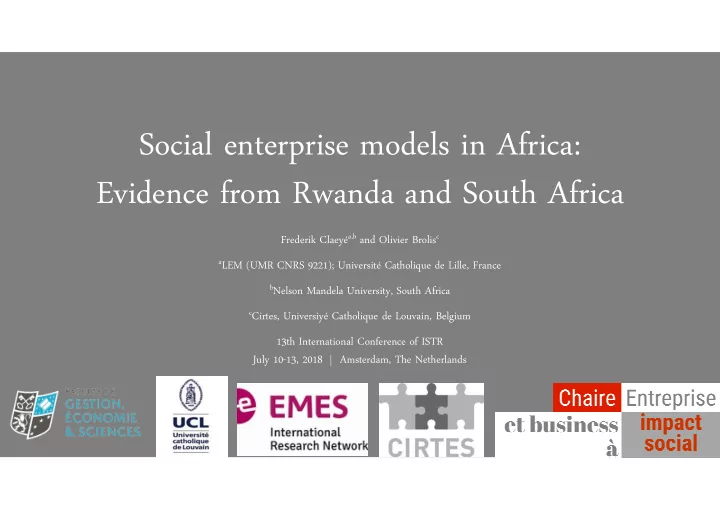

Social enterprise models in Africa: Evidence from Rwanda and South Africa Frederik Claeyé a,b and Olivier Brolis c a LEM (UMR CNRS 9221); Université Catholique de Lille, France b Nelson Mandela University, South Africa c Cirtes, Universiyé Catholique de Louvain, Belgium 13th International Conference of ISTR July 10-13, 2018 | Amsterdam, The Netherlands
Introduction • Interest in SE has grown BUT: • Problem of definition remains � ICSEM constructing ‘ bottom-up ’ typology (Defourny, Nyssens & Brolis, 2017) • Africa remains under-studied (Kolk et el, 2015) • The paper aims to contribute to our knowledge of SE models on the continent by reporting the specificities of social entrepreneurial models in Rwanda and South Africa, in comparison to what can be observed in other world regions
Theoretical background • Efforts to capture the diversity of social enterprises : • Davister et al (2004): WISEs • Alter ’ s (2007): SE operational models • Kerlin (2013, 2017): Macro-institutional SE framework • Young & Lecy (2014): SE Zoo • Defourny, Nyssens and Brolis (2017): ICSEM global typology
ICSEM background • 230 researchers from some 55 countries: • Comparative analysis of SE models and institutional trajectories • Survey carried out with a common questionnaire to build an international database covering some 730 SEs from 43 countries deemed emblematic of SE models identified • Hypothesis that data on three major dimensions would particularly inform the diversity of such models: • the nature of the social mission or social aims, • the type of economic model, • and the governance structure.
ICSEM (Defourny et al, 2017) • 4 major SE models: • Social Business • Cooperatives (worker and credit & savings) • SE with a parent organisation • NPOs (Large NPOs, small NPOs and WI NPOs) � How does this compare to Africa?
Methodology • The ICSEM Africa database: 57 SEs from 2 countries surveyed regarding 5 groups of questions/variables: • identity (origin/legal form), • social mission, • workforce, • resources • Governance • Multiple Factorial Analysis (MFA) in order to reduce the number of variables and to combine quantitative and qualitative variables into factors • Hierarchical Cluster Analysis (HCA) in order to identify the different models of SE
Status COOPERATIVES INFORMAL NPO 1 particular Parent Charity for Community tontine Community initiated NPO Mutual interest General interest community and non- (affiliated to based or unipersonal development market based a bank) business Main type of Below market Market price Free Free prices price Rules of Equal members or discounts No rules Prohibited Prohibited profit distribution 1)Market 1)Market 1) Philanthropy Resources Market 2) subsidies Other 2)Philanthropy Hybrid 2) Subsidies 3)Membership 3)subsidies Parent Origin Workers Citizens A bank An individual Citizens or individual organization or individual Large number Large number of No Workforce No volunteers No volunteers of workers and workers volunteers volunteers Services (finance, Education, Financial Human health, education, Manufacture Goods & accommodation human health, Manufacturing services for services and food) + arts & of food products and beverages construction manufacturing entertainment
Status COOPERATIVES INFORMAL NPO Parent 1 particular Community Charity for initiated NPO General tontine and non- Community Mutual interest community or interest (affiliated to market based development unipersonal a bank) based business G.A. without G.A. G.A. Governance G.A. with shares / shares or board Citizens, managers, Workers workers, experts, users Board Investors, and / / / composition providers, users donors, investors, managers volunteers G.A. or Board Decision power G.A. Bank An individual Networks NO Little NO YES Little YES
Discussion Mutual Informal Parent 1 Community interest General charity for Commun initiated particular and non- AFRICA (workers) interest local ity based NPO or tontine market cooperativ cooperatives developme NPO unipersonal (informal) based NPO es nt business Mutual Savings Parent interest and Work SOUTH Small NPOs or informal Tradition initiated and Social (workers) credits integrati for local development al NPO market business AMERICA cooperativ coopera on NPO based NPO es tives Mutual Savings Community interest and SE with a Work and non- Tradition Social WORLD (workers) credits parent integrati market based al NPO business cooperativ coopera organization on NPO NPO es tives
Conclusion • Emergence of new categories (tontine, GI coop and informal comm. dev charities) and absence of categories present in Latin America or at the global level • Data suggest that informality is an important aspect of African SE models
Thank you for your attention! Contact: frederik.claeye@univ-catholille.fr
Recommend
More recommend